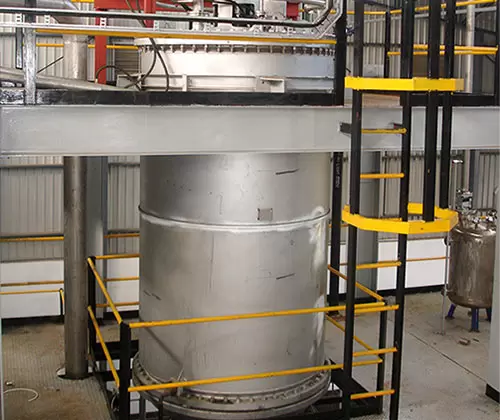Agitated Thin Film Evaporator
Agitated thin film evaporator becomes important in many industrial processes because it provides an efficient means of separating and concentrating various liquids and solutions. It is typically used for fluids that are difficult to handle due to higher sensitivity and viscosity.
Benefits of Agitated Thin Film Evaporator:
- High heat transfer rates: It provides a very high heat transfer rate due to the large surface area available for heat exchange. This makes it an ideal for processes that require rapid evaporation.
- Reduced fouling: It creates a thin layer of liquid that is constantly renewed, which reduces the likelihood of fouling and build-up of deposits on the heat transfer surfaces.
- Precise control: It provides precise control over the rate of evaporation, making it possible to achieve specific concentration levels for different solutions.
- Minimal product degradation: The short residence time of the liquid in the evaporator minimizes the chances of thermal degradation or chemical reaction of the product.
- Versatility: Agitated thin film evaporator can be used for a wide range of applications, including concentration, purification, and solvent recovery, making them useful in many different industries such as pharmaceuticals, food and beverage, chemical, and petrochemical.
- Compact design: Compact design makes it ideal for use in areas where space is limited.

Working Principle of Agitated Thin Film Evaporator:
- Feed liquid is introduced into the evaporator.
- The liquid is then spread as a thin film over the heated surface of the evaporator by the rotor blades, which agitate and continuously renew the film.
- Heat is transferred to the liquid film through the heated surface of the evaporator, causing the volatile components to evaporate.
- The vapor produced rises to the top of the evaporator and is then condensed and collected.
- The non-volatile components that do not evaporate continue to flow down the heated surface of the evaporator and are collected at the bottom.
- The process continues until the desired separation is achieved.
The advantages of using an agitated thin film evaporator include its ability to handle high viscosity fluids, its efficient heat transfer capabilities, and its ability to operate at low pressure and high vacuum.
Applications of Agitated Thin Film Evaporator:
- Chemical industry: Agitated thin film evaporators are widely used in the chemical industry for the separation and concentration of various chemicals such as solvents, acids, and oils. They are particularly useful in the production of pharmaceuticals, food additives, and synthetic resins.
- Food industry: In the food industry, it is used to separate and concentrate food ingredients, such as milk, tea, and fruit juices, to create concentrated flavors and extracts.
- Petrochemical industry: It is used in the petrochemical industry to separate and purify various petroleum products, such as fuels, lubricants, and solvents.
- Environmental applications: In environmental applications to separate and concentrate wastewater, sludge, and other hazardous materials.
- Polymer industry: It is used for the production of paints and high-quality polymers, such as polystyrene, polypropylene, and polyethylene.
